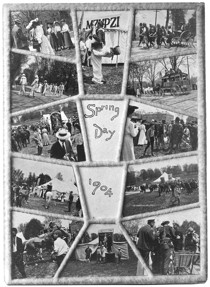CORNELL HISTORY
Impromptu holiday: Cornell's spring day

Photo collage of scenes from Cornell's Spring Day in 1904. Photo: Division of Rare and Manuscript Collections. See larger image
Every generation of Cornellians has enjoyed an annual springtime celebration in some form, ranging from parades and carnivals to picnics and concerts. Due to changes in the university calendar, 2014 marks the first time in decades that Slope Day will be held the day after spring classes finish. But Slope Day itself is only the latest version of an event that dates to 1901.
That year, student leaders organized a benefit concert in late March to support the struggling Cornell Athletic Association. The concert of student music and theater groups was preceded by a promotional noontime "circus parade," which included a dog painted with zebra stripes, a student costumed as a caged lion, and a pair of chickens labeled "dwarfed ostriches." The benefit concert and parade, as well as a "frolic on the Quadrangle," were repeated in April 1902, and by 1903, the event was officially dubbed "Spring Day."
Much like Spring Day's successors, the impromptu holiday quickly attracted faculty concern. A 1904 faculty resolution called it "needless and unworthy." Students responded, claiming: "It is the one feature of the college year which is distinctively Cornellian. … It supplies the one time of the year when every man in the University may meet his friends in that spirit of good-fellowship."
Spring Day was granted a reprieve, and the faculty suspended midday classes. The concert, parade and carnival continued until World War I canceled such frivolities in 1917 and 1918. After the war, a formal ball became a major feature of the weekend. The Medical College held its own Spring Day picnic in White Plains in 1921. But following "abuses and social excesses" that year, the faculty once again threatened to end the holiday.
Enthusiasm waned in the late 1920s, and Spring Day lost much of its grandeur during the Great Depression. The parade was discontinued in 1927, and the carnival was replaced in 1931 with the more somber dedication of the West Campus War Memorial. But 1933 returned Spring Day to its glory days, bringing a carnival and live duck race to Beebe Lake. A "beauty contest" of fraternity men in 1934 featured celebrity judges – prankster Hugh Troy '26 and cartoonist Theodor "Dr. Seuss" Geisel. A Roman theme in 1938 brought 12,000 spectators to the Schoellkopf Field "Circus Maximus." By the 1940s, Spring Day was evolving into Spring Weekend. The carnival moved to Kite Hill, and entertainers like Jimmy Dorsey and Glenn Miller headlined Barton Hall dances.
From the late 1940s through 1957, makeshift boats did battle on Beebe Lake during Spring Weekend. In 1953, the University Band gave a concert on Libe Slope as part of the weekend, followed by jazz concerts on the Slope in subsequent years, foreshadowing the modern Slope Day tradition. Fraternity parties dominated Spring Weekend through the '50s, but the tumultuous '60s began the holiday's decline. "Student apathy" was blamed for the parade's cancellation in 1962. In 1966, the faculty questioned whether the traditional suspension of classes should be endorsed.
Although major concerts at Barton Hall continued to be a big part of Spring Weekend, with Janis Joplin, James Taylor and Mary Travers in '69, '70 and '71, free concerts on Libe Slope grew in popularity. The Cornell Concert Commission brought Seatrain, King Harvest and Aerosmith in May 1973. In 1977, the university branded the last-day-of-classes party on the Slope as Springfest, with a free chicken barbecue and live music.
New York state's legal drinking age was raised to 19 in 1982 and 21 in 1985. Springfest '86 became a regulated event on North Campus, but a "Take Back the Slope" student campaign brought 4,500 students to the Slope instead. By 1990, "Slope Day" had entered the student lexicon. Safety remained a concern, with an alcohol-free Slope Fest carnival added in 1999 and a committee to evaluate the event assembled in 2001. A new era of Slope Day began in 2003, as fences were placed around the perimeter and a caterer was hired to serve beverages. Thanks to staff and student volunteers, the last decade has led to a safer spring celebration with such acts as Kanye West, Snoop Dogg, Ben Folds and Drake.
Whether you celebrated Spring Day, Springfest, Slope Day or simply a day of sunshine at the end of a long semester, Cornellians of all ages share this seasonal bond. The tradition and student body may change, but the joy and camaraderie felt by Cornellians each spring remains the same.
Corey Ryan Earle '07 is associate director of student programs in Cornell's Office of Alumni Affairs.